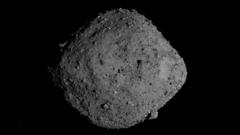The chemical building blocks essential for life have been identified in the dust collected from asteroid Bennu, according to new analyses. Researchers studying samples brought to Earth by NASA's OSIRIS-REx mission discovered a diverse range of minerals and thousands of organic compounds, including crucial elements like amino acids and nucleobases. These findings bolster the idea that asteroids may have delivered vital ingredients for life to our planet billions of years ago.
Prof. Sara Russell, a cosmic mineralogist at the Natural History Museum in London, emphasized the significance of these findings, linking them to our own origins and the larger question of how life began. The research has been published in two papers in the journal Nature.
NASA’s OSIRIS-REx spacecraft bravely collected samples from the 500-meter-wide asteroid, returning roughly 120 grams of material to Earth in 2023. Although this may seem like a small amount, it has proven to be an abundant resource for scientific discovery. Prof. Russell remarked that every grain uncovers new insights about Bennu. Scanning electron microscopes have revealed a rich assortment of nitrogen and carbon compounds within the samples.
The research indicates that Bennu is replete with 14 of the 20 amino acids necessary for life and all four nucleobases—adenine, guanine, cytosine, and thymine—critical components of DNA. Additional findings point to the presence of minerals and salts that suggest liquid water existed on Bennu in the past. The presence of ammonia, a key player in biochemical reactions, further enhances the sample's significance.
While some compounds found in Bennu have previously been observed in meteorites, many are new to science. Prof. Russell expressed excitement over the previously unidentified minerals in these samples, indicating a vibrant chemical richness that offers new avenues for research.
Dr. Ashley King from the Natural History Museum elaborated on the implications of their findings, suggesting that asteroids like Bennu could have played a role in distributing water and organic materials throughout the early Solar System. These celestial bodies would have bombarded the nascent Earth, potentially laying the groundwork for the oceans and life as we know it.
Interestingly, the research points out that Earth isn't unique in this phenomenon; asteroids may have impacted other planetary bodies too. The study raises vital questions about the conditions required for life and whether similar life-sustaining ingredients could be found elsewhere in the Solar System.
With decades of research ahead examining the Bennu samples and exploring our cosmic neighborhood, scientists are poised to tackle the outstanding questions about the origins of life in our universe.

















